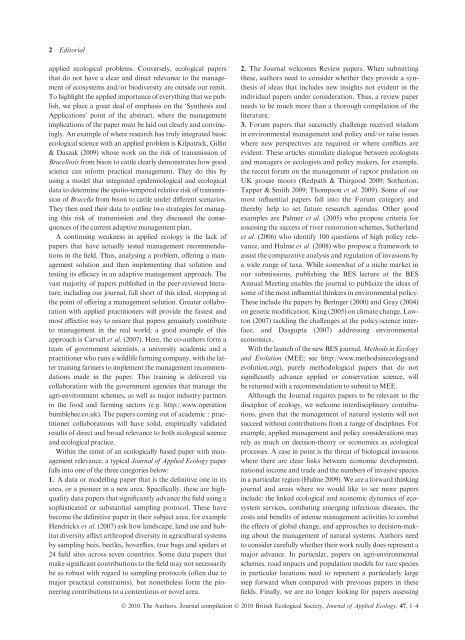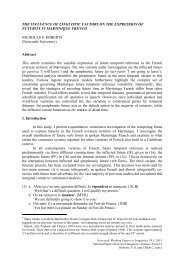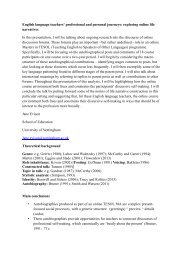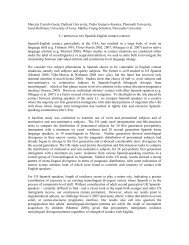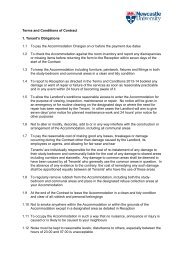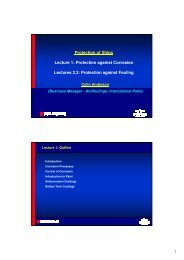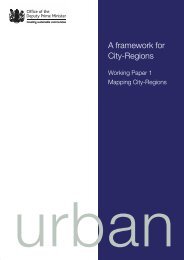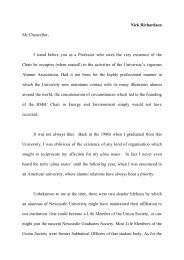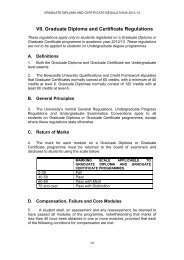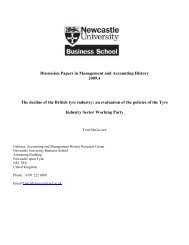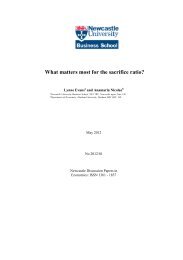Putting applied ecology into practice - Newcastle University
Putting applied ecology into practice - Newcastle University
Putting applied ecology into practice - Newcastle University
You also want an ePaper? Increase the reach of your titles
YUMPU automatically turns print PDFs into web optimized ePapers that Google loves.
2 Editorial<br />
<strong>applied</strong> ecological problems. Conversely, ecological papers<br />
that do not have a clear and direct relevance to the management<br />
of ecosystems and ⁄ or biodiversity are outside our remit.<br />
To highlight the <strong>applied</strong> importanceofeverythingthatwepublish,<br />
we place a great deal of emphasis on the ‘Synthesis and<br />
Applications’ point of the abstract, where the management<br />
implications of the paper must be laid out clearly and convincingly.<br />
An example of where research has truly integrated basic<br />
ecological science with an <strong>applied</strong> problem is Kilpatrick, Gillin<br />
& Daszak (2009) whose work on the risk of transmission of<br />
Brucellosis from bison to cattle clearly demonstrates how good<br />
science can inform practical management. They do this by<br />
using a model that integrated epidemiological and ecological<br />
data to determine the spatio-temporal relative risk of transmission<br />
of Brucella from bison to cattle under different scenarios.<br />
They then used their data to outline two strategies for managing<br />
this risk of transmission and they discussed the consequences<br />
of the current adaptive management plan.<br />
A continuing weakness in <strong>applied</strong> <strong>ecology</strong> is the lack of<br />
papers that have actually tested management recommendations<br />
in the field. Thus, analysing a problem, offering a management<br />
solution and then implementing that solution and<br />
testing its efficacy in an adaptive management approach. The<br />
vast majority of papers published in the peer-reviewed literature,<br />
including our journal, fall short of this ideal, stopping at<br />
the point of offering a management solution. Greater collaboration<br />
with <strong>applied</strong> practitioners will provide the fastest and<br />
most effective way to ensure that papers genuinely contribute<br />
to management in the real world; a good example of this<br />
approach is Carvell et al. (2007). Here, the co-authors form a<br />
team of government scientists, a university academic and a<br />
practitioner who runs a wildlife farming company, with the latter<br />
training farmers to implement the management recommendations<br />
made in the paper. This training is delivered via<br />
collaboration with the government agencies that manage the<br />
agri-environment schemes, as well as major industry partners<br />
in the food and farming sectors (e.g. http://www.operation<br />
bumblebee.co.uk). The papers coming out of academic : practitioner<br />
collaborations will have solid, empirically validated<br />
results of direct and broad relevance to both ecological science<br />
and ecological <strong>practice</strong>.<br />
Within the remit of an ecologically based paper with management<br />
relevance, a typical Journal of Applied Ecology paper<br />
falls <strong>into</strong> one of the three categories below:<br />
1. A data or modelling paper that is the definitive one in its<br />
area, or a pioneer in a new area. Specifically, these are highquality<br />
data papers that significantly advance the field using a<br />
sophisticated or substantial sampling protocol. These have<br />
become the definitive paper in their subject area, for example<br />
Hendrickx et al. (2007) ask how landscape, land use and habitat<br />
diversity affect arthropod diversity in agricultural systems<br />
by sampling bees, beetles, hoverflies, true bugs and spiders at<br />
24 field sites across seven countries. Some data papers that<br />
make significant contributions to the field may not necessarily<br />
be as robust with regard to sampling protocols (often due to<br />
major practical constraints), but nonetheless form the pioneering<br />
contributions to a contentious or novel area.<br />
2. The Journal welcomes Review papers. When submitting<br />
these, authors need to consider whether they provide a synthesis<br />
of ideas that includes new insights not evident in the<br />
individual papers under consideration. Thus, a review paper<br />
needs to be much more than a thorough compilation of the<br />
literature.<br />
3. Forum papers that succinctly challenge received wisdom<br />
in environmental management and policy and ⁄ or raise issues<br />
where new perspectives are required or where conflicts are<br />
evident. These articles stimulate dialogue between ecologists<br />
and managers or ecologists and policy makers, for example,<br />
the recent forum on the management of raptor predation on<br />
UK grouse moors (Redpath & Thirgood 2009; Sotherton,<br />
Tapper & Smith 2009; Thompson et al. 2009). Some of our<br />
most influential papers fall <strong>into</strong> the Forum category and<br />
thereby help to set future research agendas. Other good<br />
examples are Palmer et al. (2005) who propose criteria for<br />
assessing the success of river restoration schemes, Sutherland<br />
et al. (2006) who identify 100 questions of high policy relevance,<br />
and Hulme et al. (2008) who propose a framework to<br />
assist the comparative analysis and regulation of invasions by<br />
a wide range of taxa. While somewhat of a niche market in<br />
our submissions, publishing the BES lecture at the BES<br />
Annual Meeting enables the journal to publicize the ideas of<br />
some of the most influential thinkers in environmental policy.<br />
These include the papers by Beringer (2000) and Gray (2004)<br />
on genetic modification, King (2005) on climate change, Lawton<br />
(2007) tackling the challenges at the policy:science interface,<br />
and Dasgupta (2007) addressing environmental<br />
economics.<br />
With the launch of the new BES journal, Methods in Ecology<br />
and Evolution (MEE; see http://www.methodsin<strong>ecology</strong>and<br />
evolution.org), purely methodological papers that do not<br />
significantly advance <strong>applied</strong> or conservation science, will<br />
bereturnedwitharecommendationtosubmittoMEE.<br />
Although the Journal requires papers to be relevant to the<br />
discipline of <strong>ecology</strong>, we welcome interdisciplinary contributions,<br />
given that the management of natural systems will not<br />
succeed without contributions from a range of disciplines. For<br />
example, <strong>applied</strong> management and policy considerations may<br />
rely as much on decision-theory or economics as ecological<br />
processes. A case in point is the threat of biological invasions<br />
wherethereareclearlinksbetweeneconomicdevelopment,<br />
national income and trade and the numbers of invasive species<br />
in a particular region (Hulme 2009). We are a forward thinking<br />
journal and areas where we would like to see more papers<br />
include: the linked ecological and economic dynamics of ecosystem<br />
services, combating emerging infectious diseases, the<br />
costs and benefits of intense management activities to combat<br />
the effects of global change, and approaches to decision-making<br />
about the management of natural systems. Authors need<br />
to consider carefully whether their work really does represent a<br />
major advance. In particular, papers on agri-environmental<br />
schemes, road impacts and population models for rare species<br />
in particular locations need to represent a particularly large<br />
stepforwardwhencomparedwithpreviouspapersinthese<br />
fields. Finally, we are no longer looking for papers assessing<br />
Ó 2010 The Authors. Journal compilation Ó 2010 British Ecological Society, Journal of Applied Ecology, 47, 1–4


